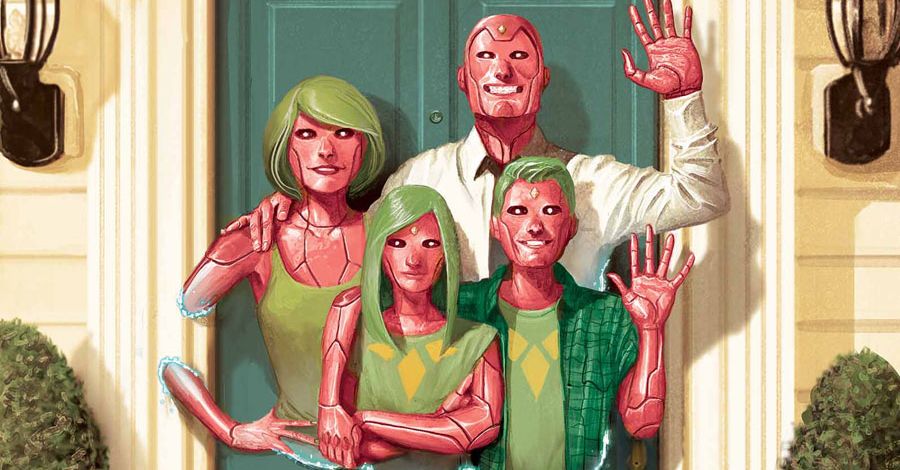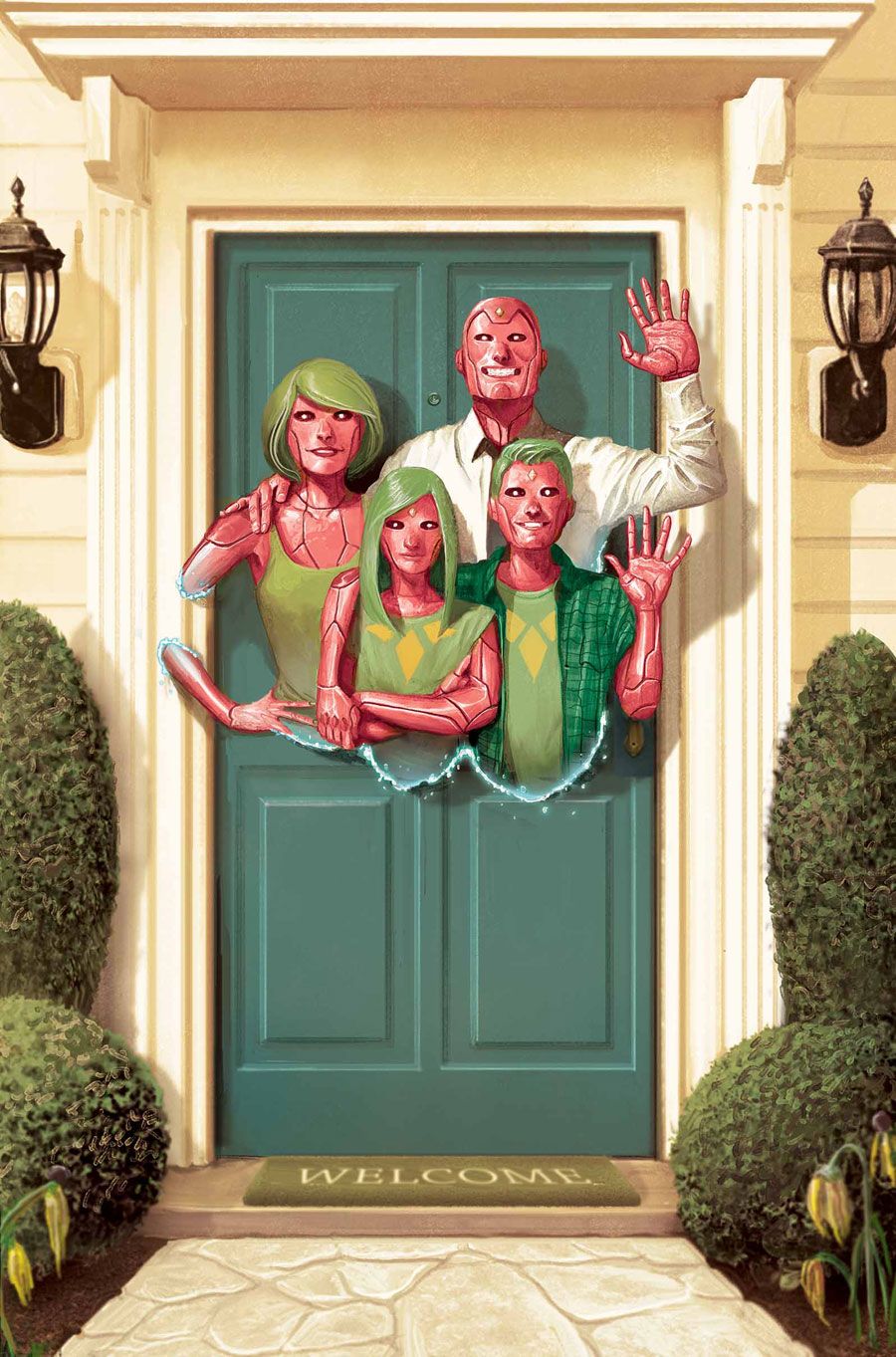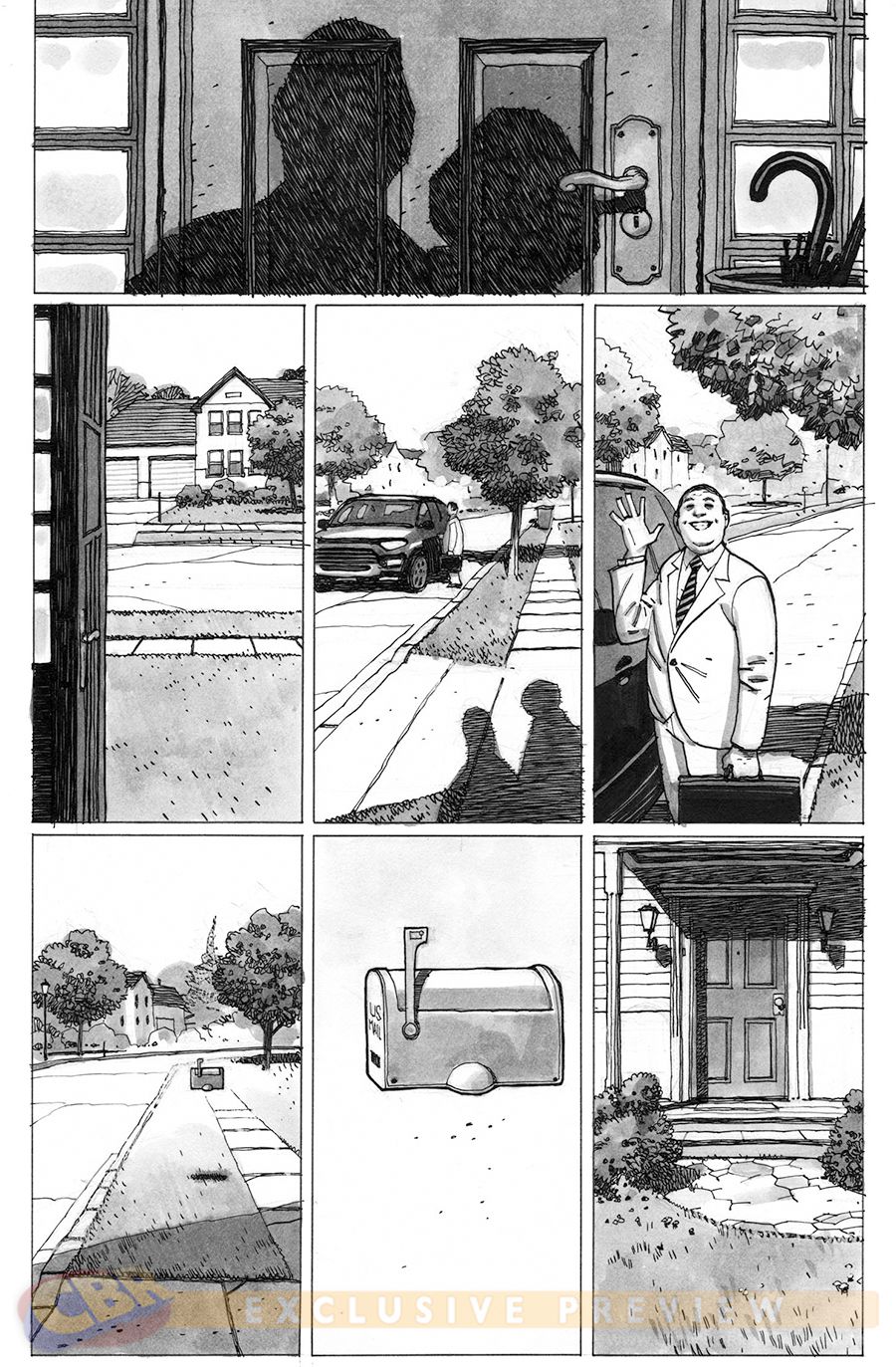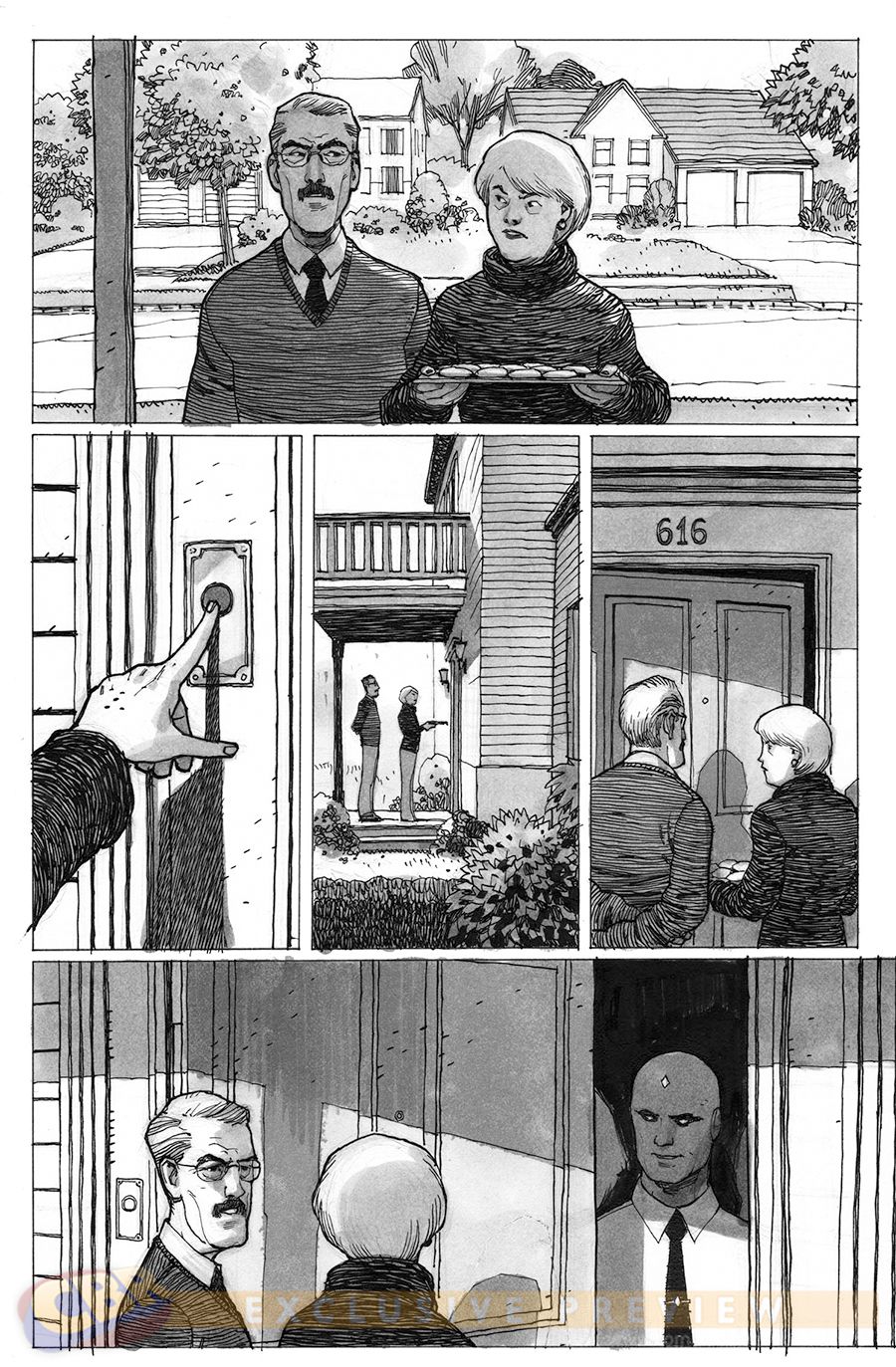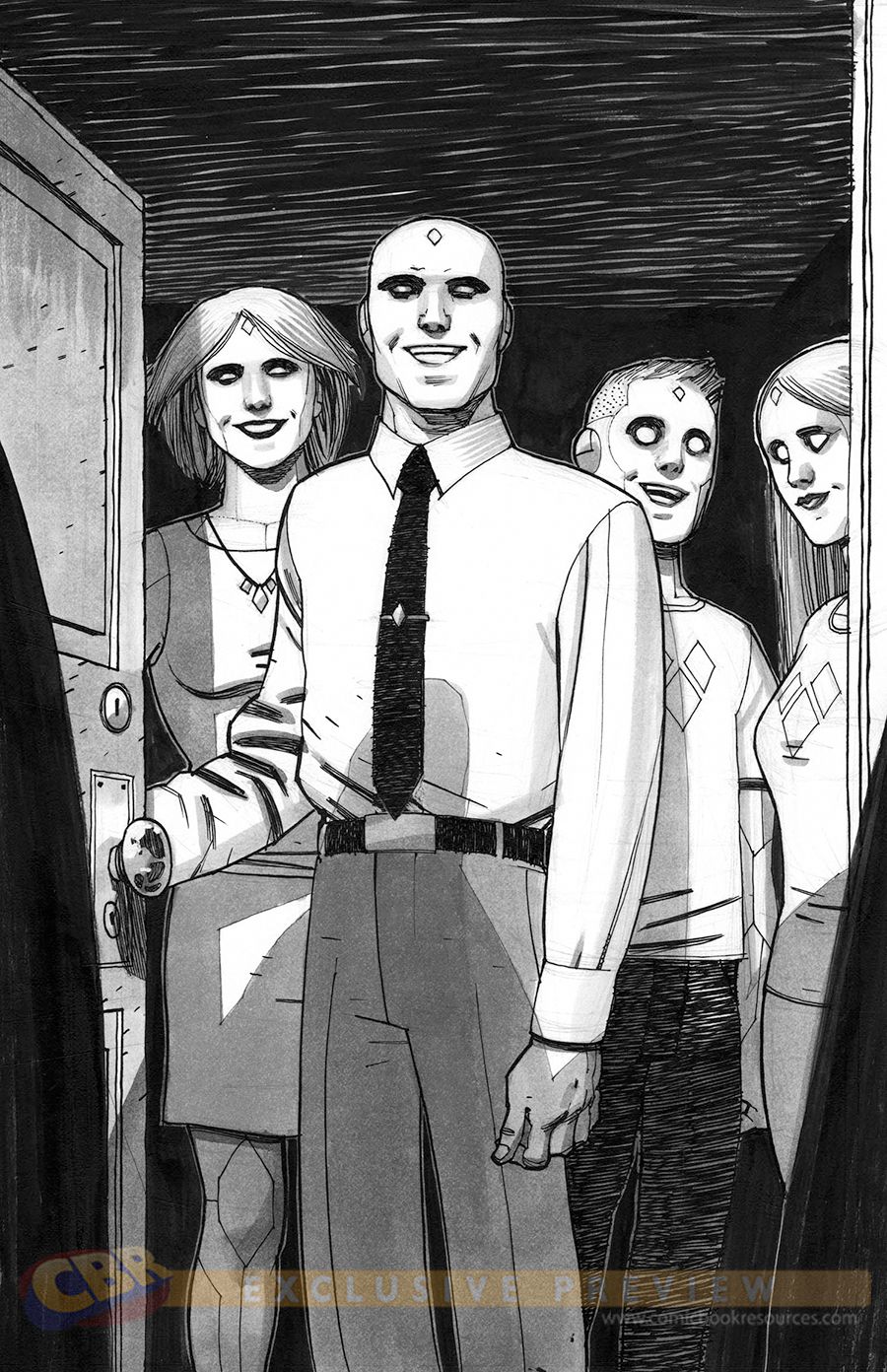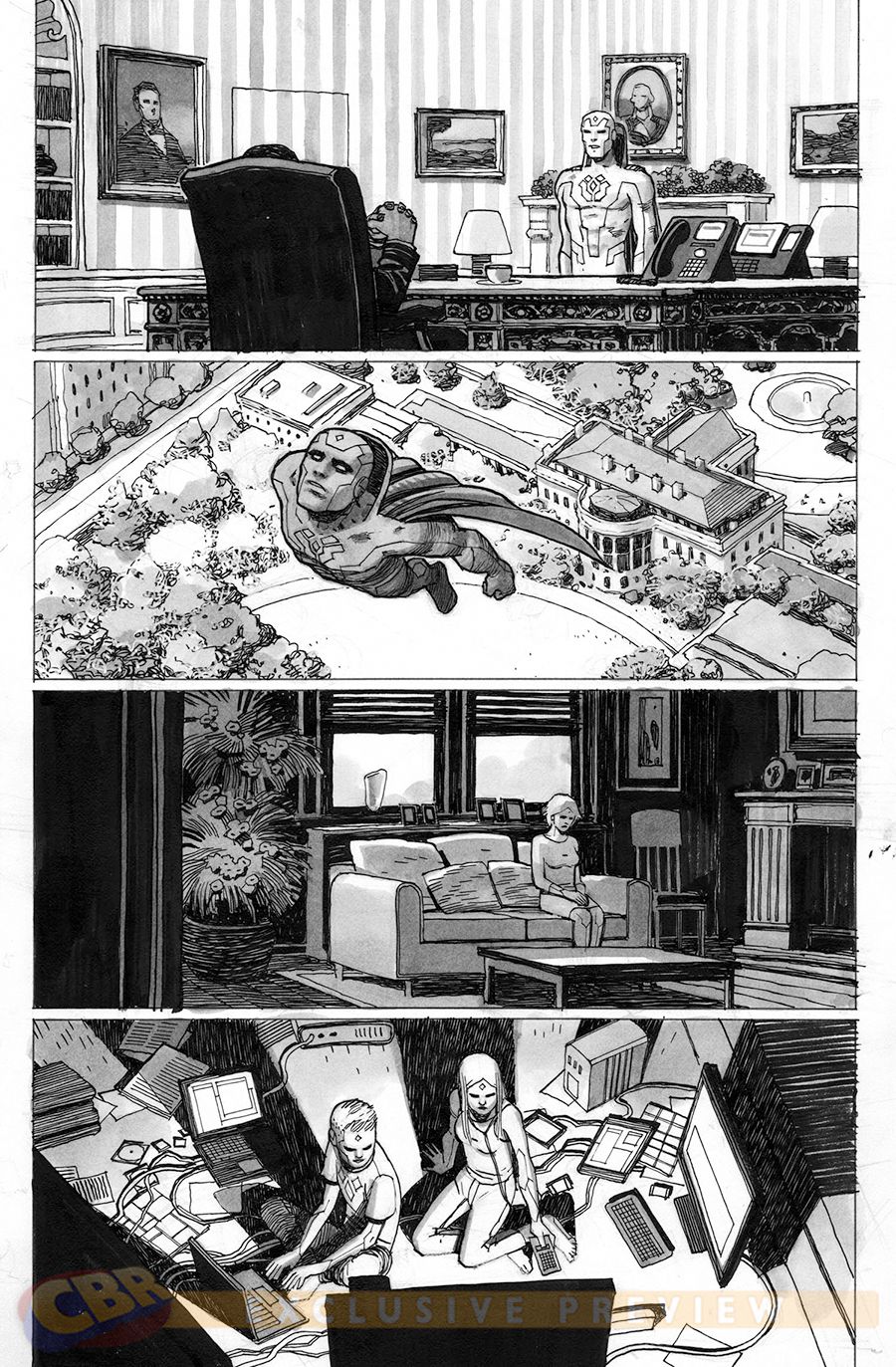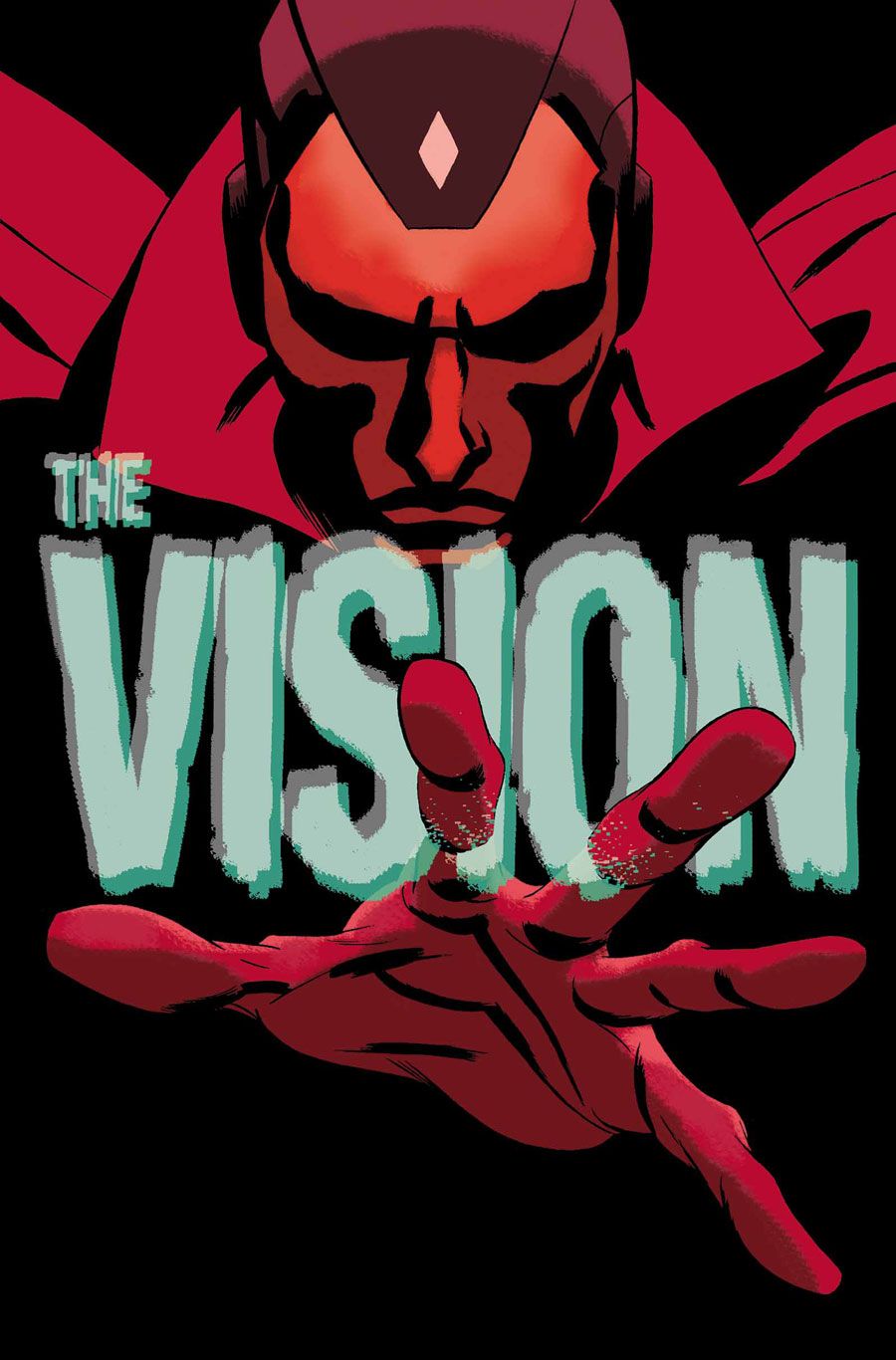One of the reasons Marvel Comics' shared universe has resonated with fans is because it's a place where even fantastic beings like aliens and artificial humanoids confront the truths us ordinary humans deal with on a daily basis -- like not being able to choose the family you're born into.
That's something that the Avenger known as the Vision has been wrestling with ever since his debut in 1968's "Avengers #57 by Roy Thomas and John Buscema. That monumental issue chronicled the Vision's origin, revealing how the genocidal robot known as Ultron built and designed the Vision as a weapon to be used against the titular team. Since then, the Vision has overcome his original programming and served on a number of Avengers teams. He even dealt with his painful past by building his own family with fellow hero Scarlet Witch -- which, yes, left the synthezoid Avenger emotionally and physically destroyed for a time. Now after being rebuilt in more ways than one, the Vision is ready to give family life another go.
King & Walta To Launch "The Vision" Ongoing This October
This November, writer Tom King makes his Marvel Comics debut alongside artist Gabriel Hernandez Walta and colorist Jordie Bellaire on "The Vision." The character's first ongoing series will chronicle the Vision's new life living in the suburbs with a family of synthezoids he created as he attempts to balance his responsibilities as a superhero with the family life he craves. CBR News spoke with King about the importance of family to the Vision, what kind of role the Vision's wife and children will have in the book and the suburban area of Washington D.C. they'll call home.
CBR News: So Tom, why the Vision? What made writing the character's solo title a compelling assignment for you?
Tom King: This is the first time Marvel reached out to me, so I was very excited. They were like, "Tom, we have a character you'd be perfect for." And I was like, "It's probably going to be another spy thing." It will probably be the Winter Soldier since I do "Grayson" for DC. It will be an easy transition.
So when they said it was the Vision I was over the moon! Because number one, I was an Avengers junkie! That was my comic growing up. It was the one I always clung to. Then number two was that he's never had his own solo series. He had the "Vision & Scarlet Witch" series, but he's never really been spotlighted that way. And with the exposure the movie ["Avengers: Age of Ultron"] has given him, it's sort of this chance to do something incredibly new with a character that was already incredibly established. So it was the best of both worlds. He has the name recognition, but he's still a blank slate to work with, so it's like a writer's dream
One of the forces driving the Vision when you kick off this series is family. Given how complicated and often painful his family history is, what inspired you to go in this direction with the character?
I think you hit it right there in your question: "complicated" and "painful." That's what writers look for [laughs]. When we see complicated and painful we're like, "Yes!" First of all, a writer's life is very complicated and painful. Second of all, it's so boring to write uncomplicated and simple. Darwyn Cooke can do it well, but I can't. [Laughs] I need angst.
King & Seeley 'Spyral' Out of Control on "Grayson"
So when thinking about the Vision, I think about his relationship with the Scarlet Witch. I think about this bizarre family he has where Hank Pym is his grandfather and Ultron is his father and these twins he had, who had this horrible and complicated end. He's had such an abnormal family life that to put him in this situation where he's trying to have a normal family life seems almost a no-brainer.
Eight months of time will have passed in-story between the end of "Secret Wars" and the start of "The Vision." In that time, Vision will have created his own Synthezoid family. What can you tell us about them? Are they aware that they are not human?
Yeah, the basic idea is Vision wants to be normal. That's one of the things that makes him compelling. That's one of the reasons Roy Thomas created him. He's this being that is utterly extraordinary, but wants to be ordinary. And what's more ordinary than family? So at the beginning of this, he's created a family. Vision doesn't hide the fact that he's a synthezoid though. He's not ashamed of that. It's part of him. So his family knows they're synthezoids. They know they're different, but they still want to sort of live the American dream. It's the classic Marvel metaphor; the super heroes are you and me. It's the idea that these are outsiders that are trying to embrace something ordinary and they have to deal with all of this stuff because of it.
Will the Vision and his family have secret identities then?
They will not have secret identities. Everyone knows he's the Vision and he has children. They live in the suburbs of Washington D.C. and they're the new family in the neighborhood. They're unlike any family that has ever moved into this neighborhood before, so this is something different for the neighborhood to get used to [laughs]. The great theme of the story is integration -- how you try to be both an individual and fit in with society.
Is this a series about a family of heroes?
His family is rather new and no one becomes a hero overnight -- except for Vision back in 1968. [Laughs] So they have his powers, but they don't really have his abilities. They don't know how to be heroes yet, and they haven't decided if they want to be heroes.
Even An Android Can Be Emo: The Vision's Five Mopiest Moments
That's the idea. Vision is letting his new wife, whose name is Virginia, and his kids, who are Viv and Vin, find their own way because he got to find his own way. He was created by a mad man who said, "This is what you have to do." And Vision is creating his family and not giving them a set fate. They have to decide what's right and wrong for themselves. They have to decide where they fit into society.
So you'll follow Virginia, Viv, and Vin on their own exploits from time to time?
Yes, absolutely. The kids will be in school and Virginia will be looking for a job. It's all going to seem very ordinary, and that's the set up. These are people with very ordinary ambitions. Vision has a day job as an Avenger, but then he comes home. These are people you see every single day, but they happen to be synthezoids. They happen to be created and not made or evolved, and they happen to have extreme powers. So can they live that ordinary life? Can they be like you and me, but still be synthezoids? That's the question at the heart of everything.
You've got the perfect artist to help you explore those questions in Gabriel Hernandez Walta. He's shown how awesome he is with strangeness and high drama in books like "Magneto" and "Astonishing X-Men."
I had this story and idea and had done the pitch, and then when they suggested Walta to me I was like, "Yes! Now what I want this book to be like in my head all makes sense!" Because he has this way of doing this quiet but really eerie paneling, where everything sort of seems relaxed and then violence explodes through the background. I was like, "That's precisely what I want!"
Then we have Jordie Bellaire on colors! Jordie colored my first comic work and she's brilliant! I feel like I've got the perfect team to tell this story.
At the end of the recent "Avengers: Rage of Ultron" graphic novel, the world believes the titular robot and Hank Pym are dead. Will their presence be felt at all in "The Vision," or will he have dealt with his feelings about them in the time between that story and the start of this series?
This is unfortunately one of those questions where I have to say, "Wait and read the book" -- especially since it touches on what's going to be in Mark Waid's "All-New All-Different Avengers" book. I don't want to spoil that either, because I worship Waid. I think it is safe to say, though, that all those aspects of the Vision -- the fact that he has Wonder Man's sort of brainwaves and all those other family ties -- are going to haunt this book. They'll all play a role.
The Vision is also connected to characters like Victor Mancha from the "Runaways," the original Human Torch, and there's the whole Jonas connection from the original volume of "Young Avengers." So he's bizarrely and tangentially related to so much of the Marvel Universe. We've got a lot to play around with, but it is a fairly self-contained story. That's sort of like the baggage he comes to this with and what he's trying to walk away from.
I think of it like the beginning of Waid's "Daredevil" run where they went back to something very simple, but the fact that Daredevil had all of that history in the background gave the story this incredible weight.
The suburbs of D.C. is a setting that really hasn't been explored in Marvel books. What made you want to set things there?
That's the fun thing about working with Marvel. The Marvel Universe is our universe. I live in Washington D.C. and I used to live in the Northern Virginia suburbs. So first of all, I wanted to write about something I knew because I think I can make things more realistic and compelling that way. Also there's something very generic about the Northern Virginia suburbs. If I set it in the New York suburbs, that unique city would still be nearby, so I wanted the setting to be very generic. I wanted it look like Anywhere, U.S.A. That's why I set it outside of New York.
What does the setting mean for the super hero side of the book? Will that type of adventure be part of the stories you're telling, or is this book focused on the collision of sci-fi and domesticity?
It's going to be both things. I can't write a comic without punching. It just makes me nervous to do it. So there's going to be a ton of action. What Marvel told me in the beginning was that they wanted to do something that could feature its own contained story that we could make very personal and very unique, so that's how I sort of think of it.
Ultron has been one of the Vision's biggest nemesis for the longest time. So with him temporarily out of commission it seems like you've got some freedom to create and add to your protagonist's rogues' gallery.
Yeah, they've given me some incredible freedom so far to tell this story and I'm using a narrative device that I haven't used before. I thought everyone would freak out about it, but they're being really cool about it. The influences for this story go back to things like "Sandman," and "Swamp Thing" and a ton of other things. So it's going to go a little crazy, but it's going to be cool.
When people who are reading the first issue and get to the first twist let me know if it makes you gasp, because it's meant to make you gasp. It's going to be something big.
You mentioned you're a long time Marvel fan. So how does it feel to be finally working for the company? Is there room for more Marvel work in your future, or is your plate pretty full with "The Vision," your DC work and your upcoming Vertigo series "Sheriff of Baghdad?"
[Laughs] Yes, it's very full. I do like to see my kids every once in a while. There is so much stuff I'd like to work with in the Marvel Universe so I definitely can't say no, but DC has been so kind too. I know exactly where I want to go with "The Vision." I want this to be insanely special. I want this to be a story that lives for a long time, so I want to put every effort behind that.
"The Vision" moves into the neighborhood in November.

